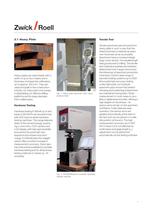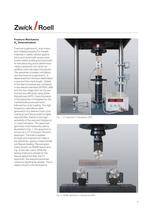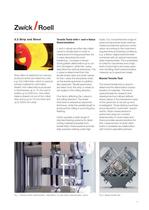 Website:
ZwickRoell GmbH & Co. KG
Website:
ZwickRoell GmbH & Co. KG
Group: ZwickRoell Group
Catalog excerpts

Testing Machines and Systems for Metals Intelligent Testing FP 253 2.0809 Testing Systems
Open the catalog to page 1
3 Fig 1: The headquarter of the Zwick Roell AG and the Zwick GmbH & Co. KG at Ulm, Germany By acquisition of the German company GTM (2006) and the Austrian company Messphysik (2007) the know-how of the Zwick Roell AG in the field of force and elongation measurement has been safed and enriched. Zwick has many years of experience, combined with a multitude of supplied systems, and this experience is continuously supplemented by constant communication with customers. On this solid base the company supplies a wide range of high-performance products – from the economical standard quality control...
Open the catalog to page 3
4 2 Metals – Use and Properties The properties of metallic materials – metals and metal alloys – cover a very broad spectrum. The distinction between function and structure also applies to materials; examples of structural and construction materials include materials for machine and plant building, precision engineering and civil engineering, while functional materials are used in areas such as electrical engineering, electronics and media technology. With construction materials the emphasis is on mechanical properties such as strength, rigidity (elasticity) and ductility (plasticity) at...
Open the catalog to page 4
5 Fig. 1: Stress-strain/crosshead travel curve of a tensile specimen made of steel sheet (tested with a Zwick Z100 materials testing machine with hydraulic specimen grips) The purely elastic strain up to the elasticity limit is only approx. 0.06 % (approx. 50 ìm); by contrast the plastic strain up to failure is almost 32 % (approx. 26 mm) – more than 500 times greater! This imposes particular requirements on the extensometer used in the same test to determine the slope of the straight line in Hooke’s Law (Young’s Modulus), the proof stress, the strain at maximum force and the strain at...
Open the catalog to page 5
6 Metal industry segments Flat products Heavy plate (plus slabs and billets) Strip and sheet (plus hot-rolled strip and hot-rolled plate) Thin sheet (plus tinplate and hot-galvanized sheet) Long products Bar and rod Sections and reinforcing steel Wire and cable Near-net-shape products Pipes (plus fittings) Castings and forgings (plus sintered metal and powder metallurgy components) Fasteners (plus welding and joining technology) – – – – – – – – – – – – – – – – – – – – – – – – – – – – –– – – – – – – – – – – – – – – – – – – – – – – – – – – – – – – – 3 Tests in the Metal Industry Type of test...
Open the catalog to page 6
7 3.1 Heavy Plate Heavy plates are steel sheets with a width of up to four meters and a thickness of at least five millimeters, up to approx. 250 mm. They are used principally in the construction industry, for heavy plant and cranes, in shipbuilding, for offshore drilling platforms and for large-diameter, thick-walled pipes. Hardness Testing Hardness testing to Brinell up to test loads of 29,000 N can be performed with ZHU topLine series hardness testing machines. This range features state-of-the-art technology, employing a zoom lens, CCD camera and LCD display, with high reproducibility...
Open the catalog to page 7
8 Robotic Testing Systems for Tensile Tests The safe, reliable and precise handling of heavy specimens places considerable demands on the operator and the operating system. Zwick’s robotic testing solutions completely automate the testing process while relieving the load on operators, minimizing operator errors and increasing operational safety and reliability. Under our robotic testing concept, the specimens for testing are sorted into magazines manually, but from this point everything takes place automatically up to sorting of the specimen remains for inspection if necessary. Additional...
Open the catalog to page 8
9 Fig. 1: CT specimen in Vibrophore (HFP) Fig. 2: SENB specimen in Vibrophore (HFP) Fracture Mechanics KIc Determination Fracture toughness KIc is an important material property for metallic materials in safety-related applications such as aircraft construction, power-station building and automobile manufacturing and is determined using a specimen into which an artificial crack has been introduced. The specimen is loaded until failure and the fracture toughness KIc is determined from the load-deformation curve and the crack length. Details of the test procedure are contained in the relevant...
Open the catalog to page 9
10 Charpy Impact Test Notched impact strength is an important characteristic for applications in pipeline construction and shipbuilding and can be determined with Charpy specimens in pendulum impact testers. The standardized notched specimens are inserted by hand, by means of simple feeding devices, or using robotic systems and impacted with energies up to 750 J. Zwick supplies temperature conditioning systems for correct conditioning of specimens down to -180 °C. Under the Machinery Directive, pendulum impact tester operation is subject to strict safety requirements, which are easily met...
Open the catalog to page 10
11 3.2 Strip and Sheet Strip refers to steel and non-ferrous products which are rolled into coils, e.g. hot-rolled strip, which is used as primary material for cold-rolled sheets. Hot-rolled strip is produced in thicknesses up to 15 mm and in widths up to 2200 mm. Hot-rolled plate is sheets cut out of hot-rolled strip and is up to 15 mm thick and up to 2000 mm wide. Tensile Tests with r- and n-Value Determination r- and n-values are often also determined in tensile tests in order to characterize forming properties; the n-value describes the work hardening – increase in stress – during...
Open the catalog to page 11
12 3-Point Flexure Test The 3-point flexure test is used for determining flexural properties and for visual assessment of the bending edge, an important aspect of the flexure test being visual evaluation of the behavior of weld seams. Zwick’s range of flexure test kit options combined with adaptations to existing specimen holders provides an ideal solution. High-temperature Tests In applications such as engine manufacture, power station construction and chemical plants, material behavior at elevated temperatures (up to approx. 1200 °C) is of vital importance, calling for high-temperature...
Open the catalog to page 12All ZwickRoell GmbH & Co. KG catalogs and technical brochures
-
Plastics & rubber
56 Pages
-
Extrusion plastometers
12 Pages
-
Image Brochure
20 Pages
Archived catalogs
-
Zwick/ZHU250
3 Pages
-
HC range
2 Pages
-
teachXpert Academia Package
2 Pages
-
Vibrophores 20-30 kN
2 Pages
-
Sheet forming 1000 kN
2 Pages
-
Creep Testing Kappa SS
4 Pages
-
Mflow Extrusion Plastometers
4 Pages
-
HDT/Vicat Allround_cool
2 Pages
-
Cflow Extrusion Plastometers
4 Pages
-
Specimen Grinder
2 Pages
-
Specimen blanking
3 Pages
-
DWT Pellini 550 and 1650
2 Pages
-
HIT pendulum impact testers
24 Pages
-
Hardness Testing with Zwick
24 Pages
-
Sheet forming 100/200 kN
2 Pages
-
TorsionLine 20 up to 500 Nm
2 Pages
-
TorsionLine 1000 bis 2000 Nm
2 Pages
-
roboTest P Metal
2 Pages
-
roboTest F_formstabil
2 Pages
-
roboTest A
2 Pages
-
Vibrophore HFP 5 and 10 kN
2 Pages
-
ProLine
2 Pages
-
PrecisionLine Automatic
2 Pages
-
testXpert II
20 Pages
-
Testing of plastics and rubber
68 Pages
-
HIT Pendulum Impact Testers
24 Pages
-
Hardness Testing with Zwick
36 Pages






























































